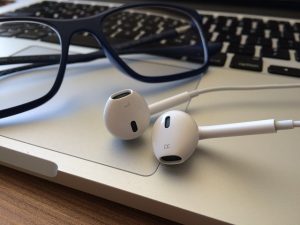Podcasts have recently seen a dramatic increase popularity. Podcasts are audio shows, often produced on a particular theme or topic, and hosted online. These audio files can be extremely valuable resources. Several have archives of hundreds of episodes. Many come with corresponding “vodcasts” (video files) as audio supplements to other media. They can provide a great supplement to class, replacement for a lecture, or additional resources for students. Because they are easy to create and accessible, a podcast assignment could replace a written paper or report. They are portable audio files; perfect for a commute, time at the gym, or other activities.
Many previous radio shows and (more recently) TV shows have been repackaged and rebranded with corresponding podcasts. Most podcasts have free webpages (many embedded from this post) that allow you to navigate to the webpage, find the link and site you are looking for, and press play. These are also great because it can be easy to link from a classroom page to an online resource. Several of the prominent sites include guides on how to incorporate them into your own classes.
Various podcasting apps or “podcatchers” can help enhance that experience. These let you to download to a mobile device (for offline listening), update when recent episodes come out, and allow you to search and browse by topic to help find the shows you are interested in. I recommend trying one, customizing the settings to meet your particular needs, and experimenting with different shows.
What follows are some of the most common applications and services (there are many others). This should not be seen as an endorsement of any particular service but a list to help get you started. There are several types of apps, services, and many contain upgradable premium functions.
Free services:
- Apple Podcasts (built into your iPhone).
- Google Play Music (Android users)
Premium(ish) services:
- Spotify (known mainly as a music service but recently expanded into podcasting)
- Pocket Casts. App specifically for the full podcast experience; easy to search, curate, and see updated episodes. https://www.pocketcasts.com/ ($4.00)
- Overcast. Gold standard for iOS podcast apps. https://overcast.fm/ (podcast player for iPhone, iPad, and Apple Watch; free with premium $10/year)
What are some good podcasts?
Radiolab with Jab Aburmrad and Robert Krulwich. Since 2002, Radiolab has been devoted to investigating a strange world. My favorite from this year has been “Unraveling Bolero”: a story about obsession, creativity, and a strange symmetry between a biologist and a composer that revolves around one famously repetitive piece of music. I was obsessed when listening the original episode and ended up staying in my car for fifteen minutes after I had reached my destination to finish the podcast. https://www.wnycstudios.org/story/unraveling-bolero
“Higher Ed” podcast by Jennifer Statyon. These 15 minute podcast cover a wide range of topics that apply to education. A recent one called “Better Problem Solving Through Puzzles” (October 28, 2018) advocates that puzzles are a great approach for students because it often simulates more real world on the job problems. http://kutpodcasts.org/higher-ed/higher-ed-better-problem-solving-through-puzzles
“Research in Action” (“RIA”) is a podcast about topics and issues related to research in higher education. The goal of the podcast is to do two things – increase research literacy and build community among researchers. Katie Linder, research director at Oregon State Ecampus, hosts. Of note, RIA includes a number of resources for instructors and specific guidelines on how to incorporate podcasts into their own classes. A very recent episode from November 26, 2018 called “Getting Started with Podcasting” that was one of the points that inspired me to blog about this topic this week. https://ecampus.oregonstate.edu/research/podcast/e139/
Teaching in Higher Ed Podcast. “This is the space where we explore the art and science of being more effective at facilitating learning. We also share ways to increase our personal productivity, so we can have more peace in our lives and be even more present for our students.” The podcast focuses on topics such as digital pedagogy, creativity in teaching, educational technology, and many others.
https://teachinginhighered.com/episodes/
Finally, it is relatively easy to create your own podcasts or create assignments that have your students create their own! At its most basic, any audio recording that you make and then upload to your students could be considered a podcast. Or consider having your students create their own podcasts instead of writing a paper. While the most popular and professionally developed podcasts have high production values – most phones contain a microphone suitable or recording. Computers also contain the basic equipment to facilitate ease of use
Consider activities:
- Create a 3-5 minute unit or module overview! This audio file could be included with your material each week and help focus students on the weekly objectives, what to do, and any specific tips to be successful with key concepts and homework for the week.
- Replace a written paper with a podcast assignment. Have students record a short 60 – 90 second audio report.
- Have student research podcasts about specific topics. While not a substitute for formal research, it helps identify additional resources and allows students the opportunity to evaluate appropriateness for a course.
– Ted Witt
Teaching, Learning, and Technology Consultant

